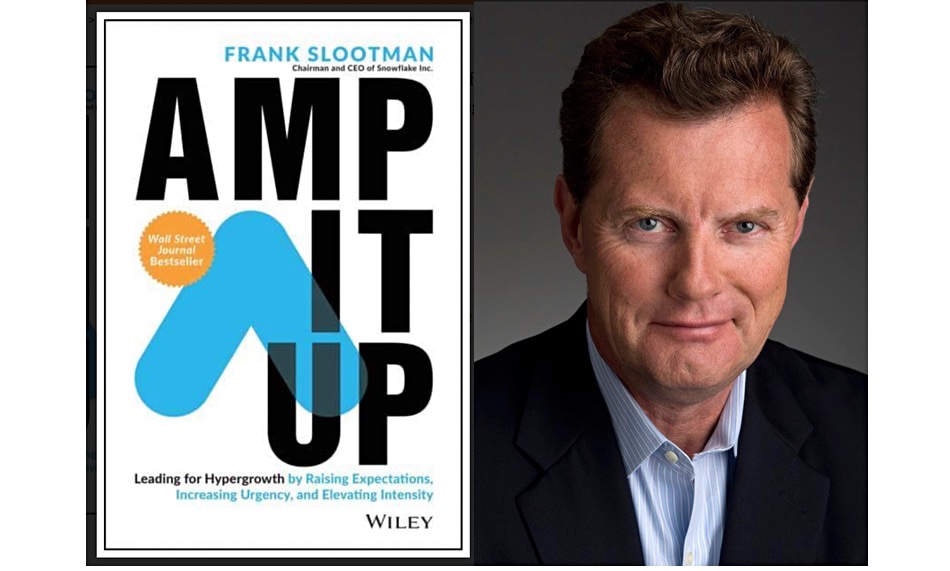Amp up your life!
I recently read a post on X (formerly Twitter) about a philosophy used to increase your business’ performance. You can read the original post here, however, I’ve also put it below. It’s based on Frank Slootman’s “Amp It Up” philosophy and approach. I love it because it’s something you can not only apply to a business, but to your approach to real estate (imagine amp’ing up your leads or simply your spreadsheet of potential cash flowing properties?!) and to your life. To be clear, “amp’ing up” my life doesn’t mean Red Bull on my granola, it means being more immediate, active and accountable to what I want to achieve in every faucet of my life. Give the post below a read, I hope you find it as interesting and inspiring as I did:
Originally posted by: @david_perell
How do you build a high-performing company?
Frank Slootman has answers. He’s led three companies to their IPOs: Data Domain, Service Now, and Snowflake. Slootman turned around these high-potential companies by implementing his “Amp It Up” philosophy.
Amp It Up has three pillars: increase the tempo, raise the standards, and narrow the focus.
Point #1:
Increase the Tempo
Without effective leadership, companies become sluggish as they grow. Malaise sets in. People become risk-averse. “I’ll do it right now” turns into “I’ll do it tomorrow,” which turns into “I’ll get it to you next week,” which turns into “Oops, I forgot about that.”
It’s a leader’s job to prevent stasis. You have to inject the organization with energy and intensity.
When people say they’ll get back to you in a week, ask them why not tomorrow or the next day? It doesn’t matter if your request is unreasonable. The point of the question is to increase people’s sense of urgency. When you change an organization’s tempo, people demand more from each other, which is the essence of a high-performing organization.
Increasing the tempo isn’t just about speed. It’s also about rejecting incrementalism.
People who work incrementally inch forward instead of taking bold leaps. They make timid decisions because they’re risk-averse. They work from a place of fear because screw-ups at most companies are so severely punished. But if you only aim for marginal improvements, you’ll only make marginal progress.
Incrementalism will kill your company, gradually sinking it into stasis and stagnation.
Avoiding risk is the riskiest strategy of all. Companies, like living organisms, need to constantly reinvent themselves.
Push people to achieve their goals way faster than they think is possible. The need for speed inspires innovation. Ask somebody to do something 20% faster, and they’ll use conventional strategies. Linear progress is the best you’ll get. But if you ask them to do something 2,000% faster, they’ll have to question all their base-level assumptions and innovate.
Point #2
Raise the Standards
When people present projects to Slootman, he asks questions like: “Are you thrilled with this? Do you absolutely love it?” If people don’t respond with raging enthusiasm, he asks them to try again.
Most managers set a low bar with murky expectations. Slootman sets a high bar with clear standards of success and failure.
Slootman’s compensation philosophy reflected his performance culture. All of his employees have a compensation review at the end of every quarter. Bonuses are divided into a pool, depending on how well the company performs. His managers aren’t allowed to pass out an equal share. He insists on a bell-shaped distribution curve to reflect the delta between high and low performers. The problem is that, at most companies, the A-players are under-paid. To pay your top performers more, you have to pay low-performing ones less.
At most companies, employees can receive bonuses without earning them. Bonuses are paid so predictably that people effectively see them as base pay. This, Slootman says, is the sure sign of an “Entitlement Culture.”
Bonuses aren’t guaranteed because the company’s success isn’t either. Market forces are always shifting. Upstarts are trying to displace you. Competitors are gunning for your market share. If instability makes people uncomfortable, they belong at the California DMV, not at an Amp’d Up organization.
Point #3
Narrow the Focus
You can’t increase the tempo and raise standards unless you also narrow the focus.
This principle is the most misunderstood. If you don’t take it seriously, you’ll think Slootman is telling you to work so hard that you become a slave, which isn’t the case.
Focus goes against our human nature. Most teams are scatter-brained. They refuse to commit and spread themselves thinly across too many priorities (many of which are ill-defined). Your job as a leader is to direct people to what’s ultimately important.
Narrow focus is also the result of clear thinking. It’s the leadership’s job to distill things down to their essentials. If leaders can’t communicate priorities at the top, how distorted will the thinking be for the rest of the team?
Left to their own devices, people will work on easy and sexy (but incremental) problems. You can’t let this happen. You have to keep people focused on the levers that move the business the most.
People resist focus because they can’t decide what’s important. Prioritization scares them. They get Shiny Object Syndrome, where they flock to the hot new thing instead of doubling, tripling, and quadrupling down on what ultimately matters. Everybody’s scope will expand unless you constrain it with clear and concrete goals.
Anything that departs from your core mission is a distraction.
—
So there you have it, a map on how to “Amp It Up”, across whichever slice of your life you choose. Be brave, be intentional and be passionate, and try using Frank Slootman philosophy to get the best out of your endeavours, big or small!
